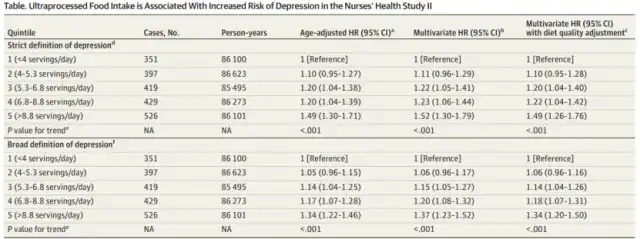Processed Foods Tied to Higher Depression Risk
- Normal Liver Cells Found to Promote Cancer Metastasis to the Liver
- Nearly 80% Complete Remission: Breakthrough in ADC Anti-Tumor Treatment
- Vaccination Against Common Diseases May Prevent Dementia!
- New Alzheimer’s Disease (AD) Diagnosis and Staging Criteria
- Breakthrough in Alzheimer’s Disease: New Nasal Spray Halts Cognitive Decline by Targeting Toxic Protein
- Can the Tap Water at the Paris Olympics be Drunk Directly?
Processed Foods Tied to Higher Depression Risk
- Should China be held legally responsible for the US’s $18 trillion COVID losses?
- CT Radiation Exposure Linked to Blood Cancer in Children and Adolescents
- FDA has mandated a top-level black box warning for all marketed CAR-T therapies
- Can people with high blood pressure eat peanuts?
- What is the difference between dopamine and dobutamine?
- How long can the patient live after heart stent surgery?
Processed Foods Tied to Higher Depression Risk.
Depression is a common mental health condition that can leave individuals feeling weak and helpless in their daily lives. Researchers are continually searching for the best methods to treat and prevent depression, with diet emerging as a significant influencing factor.
A recent study from the United States suggests that consuming highly processed foods increases the risk of developing depression. Researchers found this risk to be particularly associated with the consumption of foods and beverages containing artificial sweeteners. The study, titled “Consumption of Ultraprocessed Food and Risk of Depression,” was published in the JAMA Network journal.

Source: doi:10.1001/jamanetworkopen.2023.34770
Increasing evidence suggests that diet may impact the risk of depression. Despite a wealth of data linking ultra-processed foods (UPF), which are energy-dense and convenient ready-to-eat foods, to various human diseases, there has been limited evidence examining the relationship between UPF intake and depression.
This cohort study included participants from the Nurses’ Health Study II who did not have depression at baseline. Ultimately, the researchers analyzed data from 31,712 female participants aged 42 to 62.
Participants were surveyed using food frequency questionnaires, and researchers categorized the amount of UPF consumed based on the NOVA classification system. This classification system helps group foods based on the degree of processing and aids in identifying ultra-processed foods.
In a secondary analysis, ultra-processed foods were further categorized by their components, including ultra-processed grain products, sweet snacks, ready-to-eat foods, fats and sauces, ultra-processed dairy products, savory snacks, processed meats, beverages, and artificial sweeteners.
The researchers also used two definitions for depression: (1) a strict definition requiring self-reported clinical diagnosis of depression and regular use of antidepressant medications; (2) a broader definition requiring clinical diagnosis and/or use of antidepressant medications.
Researchers noted several potential or known risk factors for depression, including age, total calorie intake, body mass index (BMI), physical activity, smoking status, menopausal hormone therapy, total energy intake, alcohol consumption, comorbidities (such as diabetes, hypertension, lipid abnormalities), median household income, social network levels, marital status, sleep duration, and pain.

Source: doi:10.1001/jamanetworkopen.2023.34770
In this study, participants with higher consumption of ultra-processed foods had higher BMI, higher smoking rates, a higher prevalence of comorbidities such as diabetes, hypertension, and lipid abnormalities, and were less likely to engage in regular exercise. When researchers used the strict definition of depression, 2,122 participants were diagnosed with depression, while the broader definition identified 4,840 participants with depression.
The study’s findings further highlight the increased risk of depression associated with the consumption of ultra-processed foods, especially those containing artificial sweeteners and artificial sweetened beverages.
Researchers added that these highly processed foods are often produced to be cheaper, more stable, and more palatable than whole foods. This makes them more easily accessible, but they typically have high levels of calories, fats, salt, and sugar, leading to weight gain.
These research findings suggest that increased consumption of ultra-processed foods, particularly those containing artificial sweeteners and artificial sweetened beverages, is linked to an elevated risk of depression. Although the mechanisms linking ultra-processed foods to depression are not yet fully understood, recent experimental data suggest that artificial sweeteners may affect purine transmission in the brain, potentially contributing to the onset of depression.
The study’s strengths include its large sample size, prospective design, high follow-up rate, ability to adjust for various confounding factors, and the use of a well-validated dietary assessment tool. However, the study also has limitations, primarily that the study population mainly consisted of non-Hispanic white women. Additionally, without structured clinical interviews, there may be potential misclassification of outcomes.
These research findings further emphasize the benefits of reducing the consumption of ultra-processed foods for overall health. In the long run, processed foods increase the risk of depression.
Experts point out, “A diet rich in ultra-processed foods increases the risk of various health problems, including obesity, heart disease, and diabetes. This is largely attributed to their high content of unhealthy fats, sugar, sodium, and additives, which, if consumed regularly, can lead to nutritional imbalances and a range of adverse health consequences.”
There are various strategies we can adopt to reduce the intake of ultra-processed foods, including replacing them with healthier choices and opting for smaller portions. The most effective approach is to prioritize whole, unprocessed foods like fruits, vegetables, whole grains, lean proteins, and legumes in our diets. Planning and preparing meals at home can provide better control over ingredients and cooking methods, reducing reliance on packaged or fast food options.
Processed Foods Tied to Higher Depression Risk
Source: https://jamanetwork.com/journals/jamanetworkopen/fullarticle/2809727
(source:internet, reference only)
Disclaimer of medicaltrend.org
Important Note: The information provided is for informational purposes only and should not be considered as medical advice.



